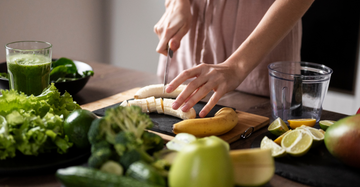In the pursuit of a healthy lifestyle, more and more people are turning to detoxification diets to cleanse their bodies of toxins and promote overall well-being. A body detoxification diet can help you rejuvenate both physically and mentally, giving you a renewed sense of vitality and energy.
In this comprehensive guide, we will provide you with all the information you need to embark on a successful and effective detoxification diet.
What are body detoxification diets?
Body detoxification diets, also known as cleansing diets, are based on the idea of eliminating toxins that have accumulated in the body through food.
During the detoxification process, processed foods are eliminated and natural, nutrient-rich foods are prioritized. This diet focuses on promoting the elimination of toxins through the elimination organs, such as the liver, kidneys, and intestines.
Body detoxification is an increasingly popular topic in today's society, as many people seek to improve their health and well-being. Detox diets have become very popular due to their promise of eliminating toxins from the body and improving overall health.
Types of body detoxification diets
There are different types of detoxification diets, such as juice diets, fasting diets, and raw food diets. Each of these diets has its own characteristics and benefits. For example, a juice diet consists of consuming only fruit and vegetable juices for a specific period of time. This diet is known for its ability to eliminate toxins and promote weight loss.
On the other hand, fasting involves abstaining from food for a specific period of time. During this time, the body undergoes a detoxification process, as it is not provided with solid food to digest. This diet can be beneficial for eliminating toxins and promoting cell renewal.
The raw food diet is based on consuming uncooked foods, such as fruits, vegetables, nuts, and seeds. This diet focuses on providing the body with nutrients in their most natural form, which is believed to help eliminate accumulated toxins from the body.
It is important to note that detoxification diets are not recommended for everyone. Before starting any type of diet, it is important to consult a healthcare professional to ensure it is suitable for your body and individual needs.
Benefits of doing a body detoxification diet
Following a body detoxification diet can have numerous benefits for your health and well-being. Some of these benefits include:
- Elimination of toxins accumulated in the body.
- Improved digestion and nutrient absorption.
- Increased energy and vitality.
- Strengthening the immune system.
- Weight loss promotion.
- Improved sleep quality.
- Reduction of inflammation in the body.
These are just some of the benefits you can experience when embarking on a body detoxification diet. However, it's important to remember that each individual is unique and results may vary.
In addition to the benefits mentioned above, a body detoxification diet can also have a positive impact on your mood. By eliminating accumulated toxins from your body, you may experience a sense of mental and emotional clarity. This can help you feel more balanced and in harmony with yourself.
Another benefit of a body detoxification diet is improved skin appearance. By eliminating toxins and promoting better digestion, you may notice a reduction in acne and other skin problems. Your skin can look more radiant and healthy.
Furthermore, a body detoxification diet can help you establish healthier eating habits. During the detoxification process, you will likely focus on consuming natural and fresh foods, avoiding processed foods and those full of additives. This experience can help you make more conscious decisions about your diet in the long term.
How long should I do body detoxification diets?
The duration of a body detoxification diet can depend on several factors, such as your personal goals, your current health status, and your lifestyle. Some people choose to do a short-term detoxification diet, which can last from one to seven days. Others choose to do a longer detoxification diet, which can extend for several weeks or even months.
Before starting any detoxification diet, it's important to talk to a healthcare professional and consider your own individual needs and circumstances. A proper and safe duration of the detoxification diet is crucial to achieve the best results without jeopardizing your health.
In the case of short-term detoxification diets, they are usually used as a "reset" for the body. During this period, processed foods, refined sugars, caffeine, and alcohol are eliminated, and the consumption of fresh, natural foods is emphasized. This can help eliminate accumulated toxins in the body and promote a general sense of well-being.
On the other hand, longer detoxification diets can be used to address specific health problems or as part of a more holistic lifestyle approach. These diets may include a variety of foods and detoxification techniques, such as green juices, intermittent fasting, or consuming specific foods known for their detoxifying properties.
It is important to note that, regardless of the duration of the detoxification diet, it is essential to maintain an adequate intake of nutrients and not compromise your health in the process. It is recommended to undertake these diets under the supervision of a healthcare professional, who can assess your individual needs and provide appropriate guidance.
Furthermore, it's important to remember that a detoxification diet should not be considered a quick fix or a way to compensate for an unhealthy diet in the long term. The key to maintaining a healthy and balanced body is to adopt healthy eating habits consistently, including a variety of fresh and nutritious foods in your daily diet.
Do these detoxification diets have a rebound effect?
One common concern about detox diets is whether they have a rebound effect once they are finished. The rebound effect refers to the rapid regain of weight lost after completing a diet. While some people may experience a slight weight increase after finishing a detox diet, this can be attributed to the gradual reintroduction of processed foods and may be a temporary result.
The key to avoiding the rebound effect after a detoxification diet is to adopt healthy eating habits in the long term. It's important to continue eating natural and nutritious foods, limit the consumption of processed foods, and maintain a balance in your caloric intake. In addition, incorporating regular exercise into your daily routine can help you maintain the weight loss and promote a healthy lifestyle overall.
In addition to following a healthy diet, it's important to consider other factors that can influence the rebound effect. Stress, for example, can trigger changes in hormone levels and affect metabolism, which can contribute to weight gain. Therefore, it's crucial to find ways to manage stress, such as practicing relaxation techniques, exercising regularly, and getting enough sleep.
Another aspect to consider is sleep quality. Lack of adequate sleep can disrupt hormonal balance and increase appetite, which can lead to weight gain. Therefore, it is essential to establish a regular sleep routine and ensure you get enough sleep each night.
Furthermore, it's important to remember that each person is unique and may respond differently to detoxification diets. What works for one person may not work for another. Therefore, it is advisable to seek the advice of a healthcare professional before starting any diet or detoxification program.
Steps to follow for a body detoxification diet
Before starting a body detoxification diet, it's important to establish a plan and follow some key steps to maximize your results:
- Set your goals: Clearly define what you want to achieve with the detoxification diet and why.
- Research and plan: Research different approaches to detoxification diets and choose the one that best suits your needs and preferences. Plan your meals and prepare a shopping list to have the right foods on hand.
- Eliminate processed foods: Get rid of processed foods and make room for natural and fresh foods in your pantry and refrigerator.
- Incorporate detoxifying foods: Add detoxifying foods such as fruits, vegetables, legumes, whole grains, and herbs to your diet.
- Stay properly hydrated: Drink enough water throughout the day to eliminate toxins and keep your body hydrated.
- Avoid harmful habits: Eliminate unhealthy habits such as alcohol consumption and smoking during your detoxification diet.
- Seek support: Consider seeking support from a healthcare professional or nutritionist to get personalized guidance and advice during your detoxification diet.
- Measure your results: Track your progress and record any changes in your body, energy, and overall well-being.
By following these steps, you will be on the right path to successfully detoxify your body and achieve your health and wellness goals.
Once you have set your goals and planned your detoxification diet, it's important to consider some additional details to maximize the benefits for your body. For example, you can consider including foods rich in antioxidants such as berries, which help fight free radicals and promote cellular health.
In addition, it is recommended to incorporate probiotic foods into your detoxification diet, such as natural yogurt and sauerkraut, as they help balance the intestinal flora and improve digestion. These foods also strengthen the immune system and promote healthy skin.
Don't forget to include foods rich in fiber, such as legumes and whole grains, as they help regulate bowel movements and promote the elimination of toxins through the stool.
In addition to following a detoxification diet, it's important to incorporate regular physical activity into your daily routine. Exercise helps stimulate blood circulation, promote the elimination of toxins through sweat, and strengthen the cardiovascular system.
Remember that each person is unique, and what works for one person may not work for another. Therefore, it's important to listen to your body and adapt the detoxification diet to your individual needs and preferences.
What should I eat if I want to detoxify my body?
If you are looking to detoxify your body with a diet, it is crucial to incorporate foods that help you eliminate toxins and provide the necessary nutrients to promote health and well-being.
Some foods you can include in your body detoxification diet are the following:
- Spinach: rich in antioxidants and key nutrients for detoxification.
- Lemon: stimulates the production of detoxifying enzymes in the liver.
- Beetroot: helps to detoxify the liver and supports liver function.
- Ginger: It has anti-inflammatory properties and stimulates digestion.
- Pineapple: contains bromelain, an enzyme that aids digestion and fights inflammation.
- Garlic: promotes detoxification and combats free radicals.
- Artichoke: helps stimulate bile production and liver function.
- Turmeric: possesses antioxidant and anti-inflammatory properties.
- Chlorella: a green algae that helps to eliminate heavy metals and toxins from the body.
- Blueberries: rich in antioxidants and vitamins, which promote overall health.
8 Foods to Avoid on Your Detox Diet
Just as some foods can help detoxify the body, there are others that are best avoided during a detoxification diet. These foods are often high in sugars, saturated fats, additives, and preservatives. Some of the foods you should avoid during your body detoxification diet are the following:
- Processed and ultra-processed foods: such as candy, cookies, potato chips, and canned foods.
- Soft drinks and sugary beverages: contain high amounts of added sugars and additives.
- Alcohol: can overload the liver and make detoxification more difficult.
- Processed meats: such as sausages, bacon, and cured meats, which contain additives and preservatives.
- Saturated fats: found in fried foods, animal fats, and whole dairy products.
- Artificial sweeteners: such as aspartame and sucralose, which can cause negative effects on the body.
- Refined flours: found in white bread, pastries, and bakery products.
- Caffeine: found in coffee, black tea, and energy drinks, can affect the nervous system and sleep.
10 Mediterranean dishes for your detox diet
Mediterranean cuisine is known for being one of the healthiest in the world. Its dishes are full of fresh, natural ingredients such as fruits, vegetables, whole grains, legumes, fish, and olive oil. Here is a list of 10 Mediterranean dishes you can enjoy during your body detoxification diet:
- Greek salad: with tomato, cucumber, red onion, olives, and feta cheese.
- Grilled fish: such as salmon or sea bass, seasoned with aromatic herbs.
- Hummus: a chickpea paste with olive oil, lemon, and spices.
- Gazpacho: a cold soup made with tomato, bell pepper, cucumber, and olive oil.
- Tabuleh: a salad of bulgur, parsley, mint, tomato, and lemon.
- Vegetable Paella: with rice, peppers, peas, green beans and Mediterranean seasonings.
- Baked chicken with lemon: chicken marinated in lemon juice and herbs.
- Legume salad: with chickpeas, lentils, tomato, cucumber, and olive oil.
- Sautéed spinach with garlic: fresh spinach sautéed with garlic and olive oil.
- Tzatziki: a yogurt sauce with cucumber, garlic, dill, and olive oil.
These Mediterranean dishes are just a few examples of healthy and delicious options you can enjoy during your body detoxification diet. Remember to adapt the recipes to your personal preferences and choose fresh, high-quality ingredients.
Other important tips for success with your body detoxification diet
In addition to following a body detoxification diet, there are other tips and practices that can help you succeed in your journey towards a healthier, toxin-free body:
Get regular physical activity: regular exercise promotes blood circulation, improves lymphatic system function, and helps eliminate toxins through sweat.
Get enough sleep: adequate rest is crucial for the detoxification process, as the body repairs and regenerates while you sleep.
Manage stress: chronic stress can negatively affect the body's detoxification process. Practice stress management techniques, such as meditation, yoga, or spending quality time alone.
Drink herbal tea: Certain herbs, such as mint, dandelion, and green tea, may have detoxifying properties and promote the body's health.
Help yourself with a natural food supplement that facilitates fluid elimination. This is the case with UNIK DETOX SLIM.
Avoid toxic chemicals: reduce exposure to chemicals and toxins in your environment, such as harsh household cleaning products.
Listen to your body: pay attention to your body's signals and adjust your diet and lifestyle as needed. Each person is unique and may have different needs.
By following these additional tips, you will be on the right path to success in your body detoxification diet and improve your overall health and well-being.
Now that you have this complete guide to a body detoxification diet, you're ready to begin your journey towards a healthier and more balanced life! Always remember to listen to your body, adapt the diet to your individual needs, and enjoy the process. Good luck!





